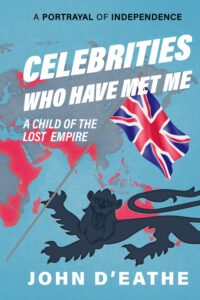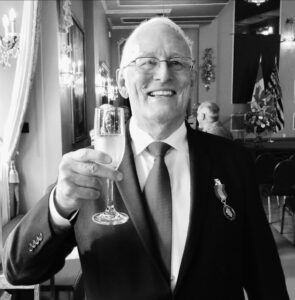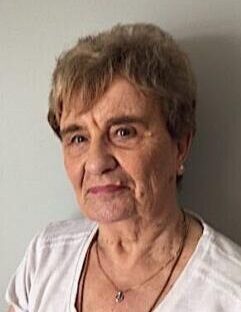What lasts (and what doesn’t)
Celebrities Who Have Met Me: A Child of the Lost Empire
by John D’Eathe
Vancouver: Adagio Media, 2024
$21.99 9781999433925
Reviewed by: Valerie Green
*

John D’Eathe’s memoir is a whimsical look at the fall of the British Empire, told through anecdotes of his life as D’Eathe travelled through many countries and observed how the once-great British Empire has quickly dissolved during his own lifetime.
West Vancouver resident D’Eathe (Laundering the Dragon) describes himself as a Child of the Lost Empire—raised before and during World War II to serve his King and country. He states that “by the outbreak of the Second World War in 1940, a few years after I was born, the British Empire still included a quarter of the world’s population and a fifth of the land mass.” Most of the original countries were still under Empire control, but things were changing. “We were under attack,” D’Eathe states.
Through amusing stories, the author then demonstrates, via a long list of “celebrities” with whom he crossed paths, how the Empire was shrinking at an alarming pace.
The over sixty celebrities include such notables as Orson Welles, Tommy Douglas, the Trudeaus, Dudley Moore, Paul McCartney, Alec Guinness, Margaret Thatcher, Lenny Kravitz, Princess Diana, Lt. Governor Judith Guichon, Premier David Eby, Prince Philip, and even Her Majesty the Queen.
D’Eathe does not neglect other lesser known ‘celebrities’ such as his own headmaster Gillingham and those he only saw from a distance. The anecdotes of how these encounters came about are divided into eight sections: Indoctrination, Colonization, Reality, Enlightenment, Elevation, Fulfilment, Independence and Conclusions.
At the end, the author adds a list of the main territories that gained complete independence from the British Empire during various time periods, and the territories still under British influence. It is an illuminating and fascinating journey of one man’s life.
The author started life as John Death, a common name in East Anglia, but early in his career, he decided the name was doomed, so an apostrophe was added to make it sound grander.
I particularly enjoyed the author’s amusing style that describes people and places as he travelled the world from England, to Hong Kong, back to England and then to Canada: “The Hong Kong Harbour was still junk-filled and teeming with crime in 1958. Illegal refugees poured in, and the colourful bars were packed with available, willing women. Hong Kong was parochial, isolated from the world, and struggling with a depressed economy.”

And later D’Eathe writes: “I had been happily waving the Union Jack for Britain as an isolated Colonialist for approaching a decade, but during that time a staggering number of countries had pulled out of the Empire. I was heading back to reality…. I was returning to a very much chastened post-Empire Britain.”
A job offer at the Grosvenor Estate near Reigate in England (with a cottage thrown in) would lead to an international office position in Vancouver, even though D’Eathe had wanted to finish his law degree and continue life as a barrister in London. “It was an intriguing decision,” he writes, but the offer was too good to refuse:
I had visited Canada several times but knew few details. I decided to do some research…. The Queen, Mounties and beavers! That all sounded safe enough, so I made my final deal with Grosvenor, packed my bags, thanked Sir Bill and Lady Nora for the use of their cottage and their local pub, and in 1967 I headed off expectantly to discover Canada.
Canada led to a long career in major property investment and development throughout North America and in various parts of the globe. These adventures are all told in the next sections of the book. I was particularly moved by his words concerning Princess Diana. He never had the pleasure of meeting her butsaw her at the opening of Expo ’86 (where she suffered a dramatic fainting spell at one point). He adds,“I had a guarded account of her personally from Mim Kwok [his business partner’s wife], whom Princess Diana had befriended,” and notes, “Mim was delighted when she was sought out in her private Royal Suite and taken by Diana for coffee alone with her, during the two-hour cruise back to Vancouver.”
The princess unburdened herself quite freely about her life and personal struggles. She appeared to be a very troubled young woman and clearly wanted someone to talk to, away from all the dignitaries on board. Mim was“a very charming sympathetic person and she listened quietly. Mim was also very discreet.”
D’Eathe ends that anecdote with the words: “Princess Diana’s premature death and the conveyance of my Hong Kong colony to Communist China, both in 1997, ended a century of dramatic change. Almost all the countries of my heritage were gone. The Child of the Empire was bereft!”
I enjoyed how D’Eathe managed to weave in the history of the parts of the British Empire that he describes so vividly. Throughout his long and rambling stories of the “celebrities who have met him” he states, “Despite all the negative things I have expressed about the Empire, Her Majesty Queen Elizabeth has remained high in my own affection and respect.”
He always felt they had a personal connection, being only ten years her junior, and as a youngster watching movies that showed her serving in uniform during the war. D’Eathe was devastated by her death.
He recalls that soon after Charles and Camilla’s marriage, when he was still Prince of Wales, on one of their visits to Canada, John and his wife Lane were invited to a reception in Vancouver to be graced by the royal couple.
However, Lane told John: “I have no intention of attending or risking meeting them, after the terrible way they treated my Diana.”
And that, states the author whimsically, is why “despite my life of service to Queen Elizabeth, His Majesty King Charles the Third… has failed to meet me.”
It seems like an appropriate way to end this portrayal of Independence.

*

Valerie Green was born and educated in England, where she studied journalism and law. Her passion was always writing from the moment she first held a pen. After working at the world-famous Foyles Books in London (followed by a brief stint with MI5 and legal firms), she moved to Canada in 1968 and embarked on a long career as a freelance writer, columnist, and author of over twenty nonfiction historical and true-crime books. Hancock House recently released Tomorrow, the final volume of The McBride Chronicles (after Providence, Destiny, and Legacy). Now semi-retired (although writers never really retire!) she enjoys taking short road trips around BC with her husband, watching their two beloved grandsons grow up and, of course, writing. [Editor’s note: Valerie Green has recently reviewed books by M.A.C Farrant, Olga Campbell, Beka Shane Denter, Kate MacIntosh, Rosemary Neering, Winona Kent, Michael L. Hadley, Jason A.N. Taylor for The British Columbia Review.]
*
The British Columbia Review
Interim Editors, 2023-26: Trevor Marc Hughes (non-fiction), Brett Josef Grubisic (fiction and poetry)
Publisher: Richard Mackie
Formerly The Ormsby Review, The British Columbia Review is an online book review and journal service for BC writers and readers. The Advisory Board now consists of Jean Barman, Wade Davis, Robin Fisher, Barry Gough, Hugh Johnston, Kathy Mezei, Patricia Roy, and Graeme Wynn. Provincial Government Patron (since September 2018): Creative BC. Honorary Patron: Yosef Wosk. Scholarly Patron: SFU Graduate Liberal Studies. The British Columbia Review was founded in 2016 by Richard Mackie and Alan Twigg.
“Only connect.” – E.M. Forster